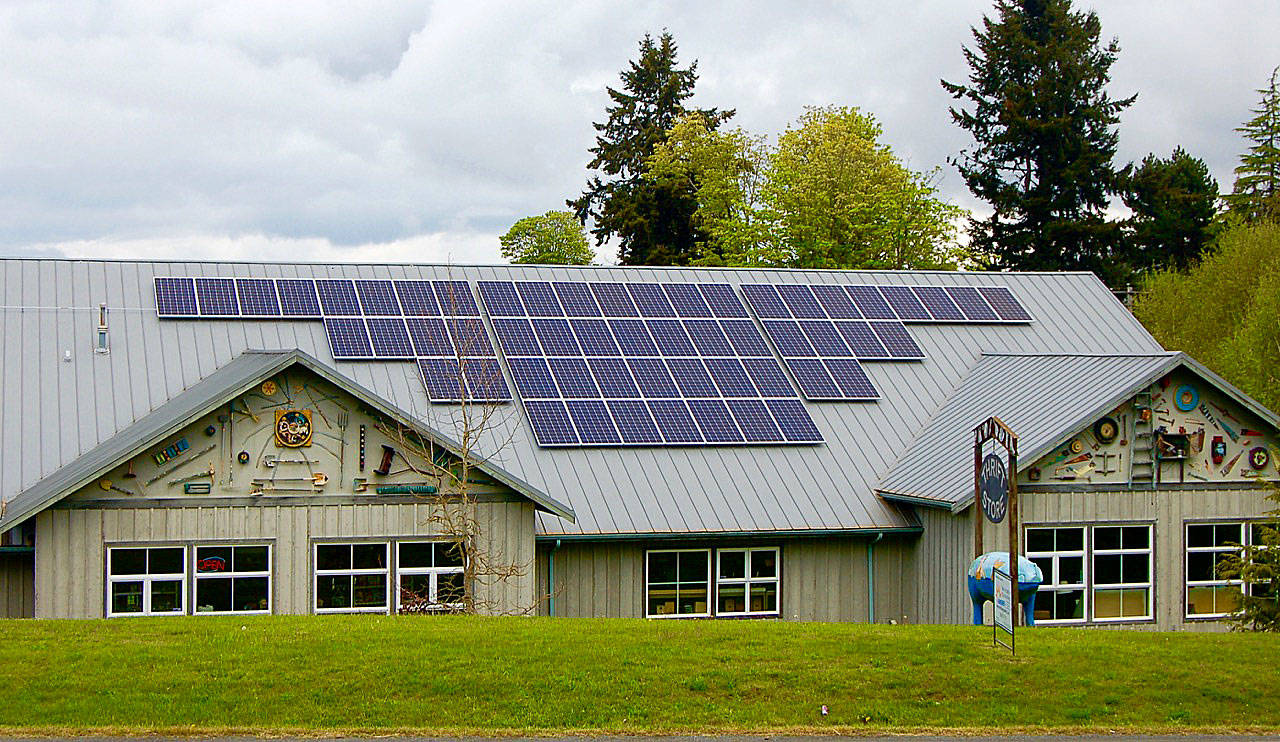On a sunny day last week, inside Community Thrift of Freeland the lights were on, the registers rang up sales, the electric outlets worked, and office computers were humming.
But no power came from the electrical grid. Instead, solar cells on the roof of the building were transforming the energy of the sun into the electricity that allowed Community Thrift to operate.
Only a month old, the store’s solar transformation has already lowered its power bill, and expectations are that it will save $100,000 in electricity costs over the next 25 years.
“That savings will allow us to dedicate more money to the services we provide for seniors,” said Cheryn Weiser, executive director of Island Senior Resources, which runs Community Thrift. The myriad programs range from community lunches and Meals on Wheels to housing, support groups, classes, information and assistance, excursions, special events and more.
The solar project is the result of a $50,000 grant from Puget Sound Energy’s Green Power program, one of five PSE donations totaling $350,000 to install solar panels at organizations serving local communities. In addition to Island Senior Resources, those receiving grants are Northwest Harvest in Kent, Community Action of Skagit County, Salvation Army Bremerton and the Upper Kittitas County Senior Center.
The service groups had previously received grants from the PSE Foundation to purchase high-powered generators for use during power outages. Those organizations, which included Senior Resources, were invited to apply for the solar grants.
“When PSE decided to offer solar grants, Community Thrift seemed a good candidate, given the configuration of the roof and how many dollars they’ll save over the life of the installation,” said Walt Blackford, PSE’s community services manager in Freeland.
Blackford provided advice and guidance as Senior Resources worked to complete the grant application. Included were invitations to bid for the solar array installation. Whidbey Sun and Wind, a renewable energy systems company based in Coupevdlle, was selected to do the work, which began in early March.
Sun and Wind Operations Manager Paul Dickerson said the 20 kilowatt grid-tied project included 56 panels, which took a week to install. Grid-tied systems use photovoltaic, or PV, modules to integrate solar electric power with existing electric utility power.
“The solar panels are made with monocrystalline silicon cells laminated with glass and sealed in an aluminum frame,” Dickerson said. “They’re attached to aluminum rails that are secured to the roof with clamps that attached to the roof seams.” The electricity they produce is routed to a utility interactive inverter, which changes the DC current to AC current.
They are connected to a circuit spliced into the panels and produce direct current. A utility interactive inverter changes DC current to AC current. When the output of the PV modules exceeds the demand of the loads requiring electricity, excess power is diverted to the utility grid.
Whidbey Sun and Wind notes that there are several financial benefits with solar power. The user receives retail-rate credit for the electricity that flows back into the grid. For PSE customers, that’s about 9 cents per kilowatt-hour, or kWh.
An incentive payment for every kWh produced is earned whether the energy is used or not. This is the production or cost recovery incentive and runs through June of 2020. Production payment rates for most utilities are between 15 and 54 cents per kWh, depending on the components used. PV system purchasers also receive a 30 percent federal tax credit.
According to PSE, Washington has doubled the amount of solar power generated each year since 2006. Whidbey Sun & Wind was established in 2000 and was involved with the first grid-tied PV installation in the state. The company has installed over 1,800 kW of solar modules.
“We’ve done about 500 jobs, from Whidbey and Anacortes as far as the San Juans, Snohomish County and a few on the Olympic Peninsula,” Dickerson said.
The company founder is Kelly Keilwitz, who has a degree in geological engineering from Washington State University and is a registered professional civil engineer.
Keilwitz’s training in renewable energy began in 1999 with Solar Energy International.
Operations Manager Paul Dickerson was part of WWU’s solar car racing team that raced across the United States and Australia in 1990 and 1991. He has held engineering positions at Boeing and Starbucks Coffee, and also has a significant amount of experience in the construction industry.
The company website is www.whidbeysunwind.vom.



